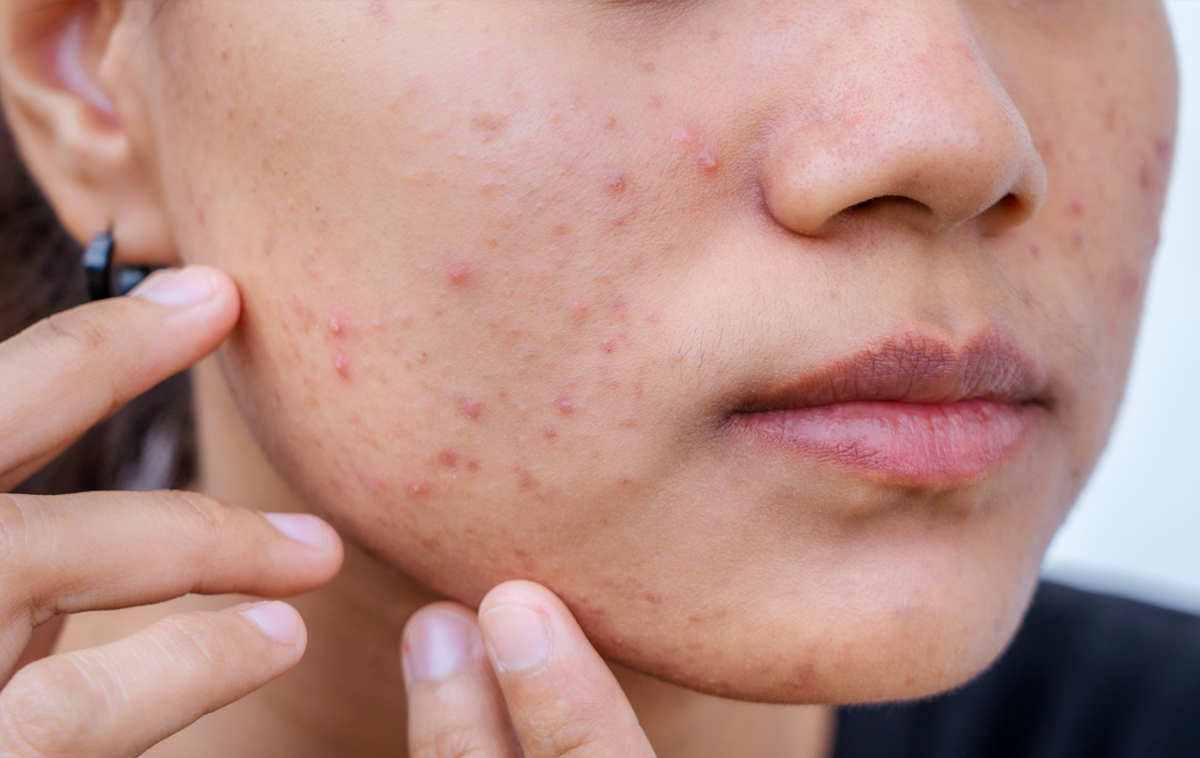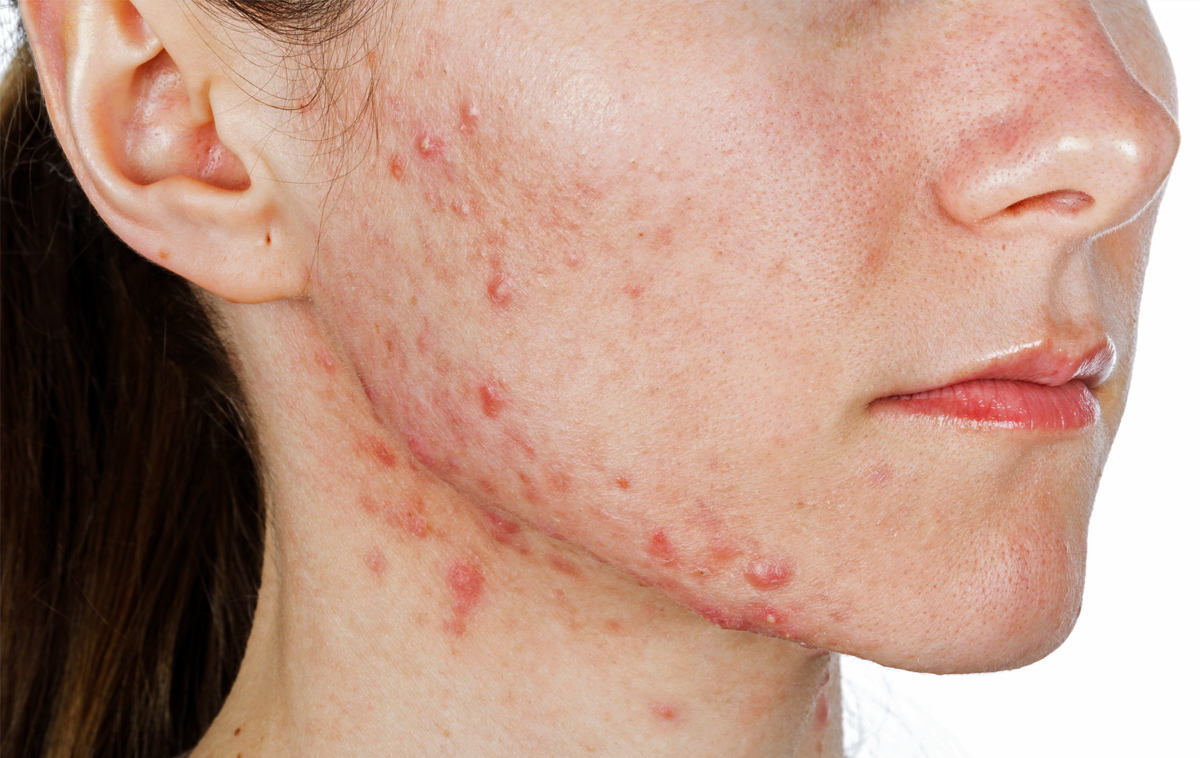Key points
- Pimples are small skin bumps created when pores get blocked by oil or dead skin.
- If your teen gets a lot of pimples, they may have a common skin condition called acne.
- Pimples and acne are very common in teens; diet does not usually cause them.
- Acne is not a sign of dirtiness or a lack of hygiene. It is often related to hormones and genetics.
- The best skin care for young people with acne is a simple routine of cleanser, moisturiser, and sunscreen.
- Your teen should always put on sunscreen if the Ultraviolet (UV) Index Forecast is 3 or more, and wash it off at the end of the day.
- If your teen has acne, a doctor may give advice and suggest treatments.
Pimples and acne
What are pimples?
Pimples are small bumps on the skin. They happen when oil or dead skin cells block pores (tiny openings that release sweat and oils). Pimples can develop anywhere on the body with oil glands, but the face, neck, chest and back are the most common areas.
What is acne?
Acne is a very common skin condition that causes pimples and other blemishes on the face and body. It often starts during puberty; however, children can have it, too.
In most cases, acne in puberty starts clearing up after a few years, but for some people, it lasts into adulthood. Adult acne is more common in women; hormones or other factors like stress can trigger it.
What causes acne in teens?
The body starts producing more hormones during puberty. These hormones increase the size of the skin's oil glands, so they make extra oil. This oil may block skin pores and trap dead skin cells, causing bacteria to grow inside and leading to pimples,
inflammation, redness, swelling and pain.
The face, neck, chest and back are most likely to develop acne as they have the most oil glands.
Acne can run in families. If you had acne, there is a higher chance your teen will have acne.
It is important to know that acne is not caused by dirtiness or a lack of hygiene, and it is rarely caused by food.
Signs and symptoms of acne
Acne can cause large amounts of:
- Whiteheads = small white bumps – often raised
- Blackheads = small, blocked pores that look like black spots
- Papules= small red bumps
- Pustules = small bumps filled with pus – often white or yellow in the centre
- Nodules= large, round bumps under the skin
- Cysts = large bumps filled with fluid and pus.

Figure one: Female teen with acne across her cheeks and jaw.
The occasional pimple or blackhead is not considered acne.
Cystic acne
Cystic acne is a severe type of acne. The blemishes caused by cystic acne are often deep and painful. They may not have a visible white or yellow centre. Cystic acne is more likely to leave scars. If you think your teen has cystic acne, it is a good idea
for them to see their doctor.

Figure two: Female teen with cystic acne across her cheeks, jaw and neck.
What skincare should my teen use?
Young people should always take care of their skin – even if they do not have acne. For most teens, this means following a simple routine with three products: cleanser, moisturiser and sunscreen. The key is washing their face twice daily, keeping their
skin hydrated and protecting it from the sun. Unless a doctor or health professional suggests them, teens do not need to use serums, scrubs or other products.
Here is a simple skincare routine your teen can follow morning and night:
Morning
- Wash face with water and a soap-free cleanser.
- Put on moisturiser.
- Apply an SPF50 (Sun Protection Factor 50) or higher sunscreen on days when the UV (Ultraviolet) rating is 3 or above – usually from late spring and all through summer.
Night
- Wash face with water and a soap-free cleanser.
- Put on moisturiser.
Unscented and soap-free skincare should not make acne worse. However, if your teen has oily, acne-prone skin, they may be better off using either moisturiser or SPF (on days with a UV rating of 3 or above), rather than both.
A pharmacist or doctor can give your teen specific product advice for acne-prone skin.
Tips to help teen skin health
- Encourage your teen to wash their face in the morning, at night and after they play any sport. A soap-free cleanser is best. Cleansers with an ingredient called ‘salicylic acid’ can help break down oil and unblock pores.
- Ensure your teen uses oil-free or matte-finish makeup if they choose to wear any. These are sometimes labelled 'non-comedogenic' or 'non-acnegenic.' They should also take off their makeup every night using cleanser or micellar water, not makeup remover
wipes.
- Prompt your teen to use sunscreen with SPF50 or above if the UV rating is 3 or above. Sunscreen gels, liquids, light creams and sprays are best for acne-prone skin.
Ideally, your teen should also stay in the shade, and wear a hat and long clothing.
- Try to help your teen eat a balanced diet with more ‘whole foods’ like fresh fruit, and less processed and fried foods, like hot chips. They
should also aim to drink six to eight cups of water a day or 1.5 to 2L (litres).
- If your teen has pimples or acne and uses a non-prescription product to clear them, make sure they follow the instructions carefully. Many have ingredients that can dry out the skin if used too often.
How to help a teen with acne
There are lots of different treatments for acne. Start by helping your teen follow a simple skincare routine, drink lots of water, and eat a balanced diet. If this does not help, speak to a pharmacist or doctor about over-the-counter acne treatments for
your teen's skin type. These can take time to work, so encourage your teen to be patient.
Your teen should speak to their doctor if nothing seems to help their acne. The doctor may suggest prescription treatments or refer them to a dermatologist (specialist skin doctor).
Common questions about acne and teen skin health
What can doctors do for pimples?
Doctors can prescribe products and medicines to help clear up long-term acne. Your teen’s local doctor (general practitioner or ‘GP’) may start by prescribing a cream or lotion. If this does not work, they may prescribe oral antibiotics. They
may refer your teen to a dermatologist if their acne is still not improving.
A dermatologist may suggest a medicine called isotretinoin – an oral retinoid. Isotretinoin is very good at clearing stubborn acne, but it does have some side effects, so you and your teen should talk to a doctor before they start taking it.
My teen’s acne is affecting their confidence. How can I help?
Pimples and acne can be very upsetting – especially for teens. It can affect their confidence and self-image at a time when they are learning about themselves and their place in the world. If you are working with your teen to treat their acne,
it is also a good idea to address their mental health. Support your teen by asking them open questions about how they are feeling and reassure them that their skin will get better over time. If they have very low confidence and worry about
their body image, they may benefit from speaking with a mental health worker, such as a school counsellor or psychologist.
My teen wants to use products with active ingredients. Will these help their skin?
Skincare products are promoted all over social media and in popular cosmetic stores. If your teen's favourite influencer is talking about a product that helped their skin, it makes sense that they may want to try it, too. In reality, teens will
rarely benefit from the active ingredients popular in adult skincare. Retinol and other trending actives are very strong; they may be more likely to irritate your teen's skin than help it.
Is it bad to squeeze pimples?
Your teen should never squeeze or pick their pimples. Squeezing and picking can lead to skin infections and create lasting scars, worse than the pimples and more permanent.
Is my teen’s diet causing their pimples?
Food alone does not cause acne. However, if your teen eats a lot of processed foods and sugar, this may be making their pimples worse. Suggest some simple swaps to get more nutrition into their diet, such as eating nuts instead of chips or fruit
instead of chocolate. Your teen may find this makes a difference. A registered dietitian can give them personalised diet advice.
Are there any natural remedies that are helpful for acne?
Your teen should speak with their doctor or another health professional about natural remedies for acne before trying anything new. This is because some may irritate their skin further or interact with other treatments or medicines they take.
For more information
Developed by The Royal Children’s Hospital (RCH) Dermatology department, with input from the Adolescent Medicine department. We acknowledge the input of RCH consumers and carers.
Reviewed August 2025
Please always seek the most recent advice from a registered and practising clinician.